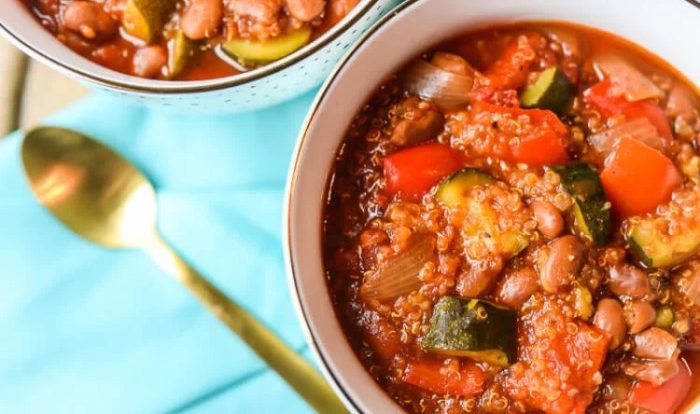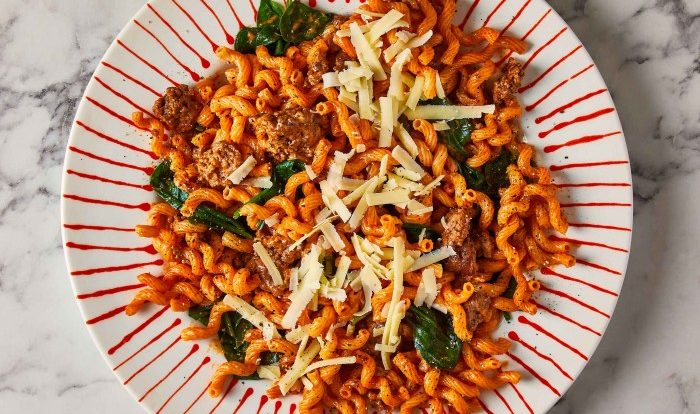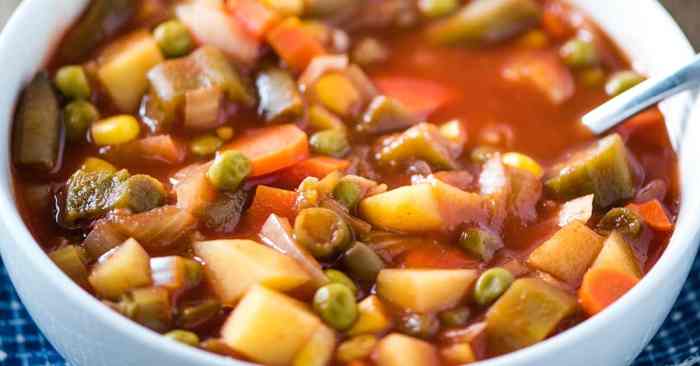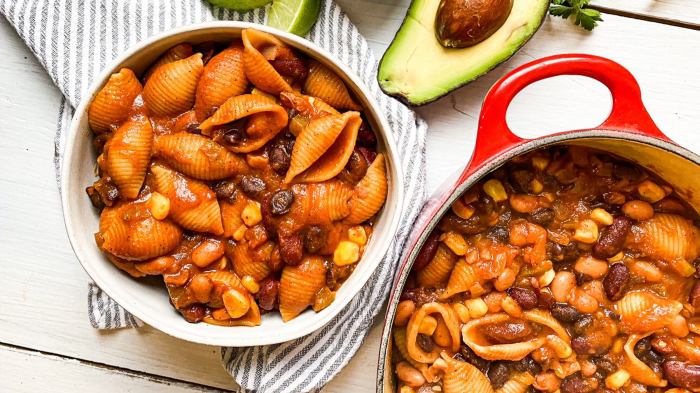Protein in 100g oats sets the stage for this enthralling narrative, offering readers a glimpse into a story that is rich in detail and brimming with originality from the outset. This exploration delves into the nutritional significance of oats, shedding light on their protein content and its implications for a balanced diet.
As we delve deeper into the topic, we will uncover the intricacies of protein absorption and utilization, examining how the amino acid composition of oats influences their nutritional value. A comparative analysis of oats against other grains will provide valuable insights, highlighting the advantages and disadvantages of oats as a protein source.
Nutritional Value of Oats
Oats are a whole grain cereal that is packed with essential nutrients. They are a good source of fiber, protein, vitamins, and minerals. One hundred grams of oats contain approximately 17 grams of protein.Protein is an essential macronutrient that is required for a variety of bodily functions.
It is used to build and repair muscle tissue, produce enzymes and hormones, and transport nutrients throughout the body. Protein is also essential for immune function and blood clotting.
Protein in Oats
The protein content of oats is comparable to that of other whole grains, such as brown rice and quinoa. However, oats contain a unique type of protein called avenin. Avenin is a water-soluble protein that is easily digestible. This makes oats a good choice for people who have difficulty digesting other types of protein.In
addition to being a good source of protein, oats are also a good source of fiber. Fiber is important for digestive health and can help to lower cholesterol levels. Oats are also a good source of vitamins and minerals, including iron, zinc, and magnesium.
Protein Absorption and Utilization: Protein In 100g Oats
The human body digests and absorbs protein in a complex process that involves several steps. After ingestion, protein is broken down into smaller peptides and amino acids by enzymes in the stomach and small intestine. These amino acids are then absorbed into the bloodstream and transported to various tissues and organs for utilization.
The amino acid composition of oats is a key factor that influences protein utilization. Oats contain a relatively high proportion of essential amino acids, which are those that cannot be synthesized by the body and must be obtained from the diet.
The presence of these essential amino acids makes oats a valuable source of protein, especially for vegetarians and vegans.
Factors Influencing Protein Absorption, Protein in 100g oats
Several factors can influence the absorption of protein from oats, including cooking methods and food combinations.
With 13 grams of protein per 100g, oats are a great source of protein for those looking to add more protein to their diet. If you’re on a diet, oatmeal is a great option for a filling and nutritious meal.
It’s low in calories and fat, and it’s a good source of fiber. Check out oatmeal for diet for more information. The protein in oats can help you feel full and satisfied, and it can also help you build and maintain muscle mass.
- Cooking Methods:Cooking oats can improve protein absorption by breaking down the protein structure and making it more accessible to digestive enzymes. Studies have shown that cooked oats have a higher protein digestibility than raw oats.
- Food Combinations:Consuming oats with other protein sources, such as dairy products or legumes, can enhance protein absorption. This is because the different amino acid profiles of these foods complement each other, providing a more complete range of essential amino acids.
Comparison to Other Grains
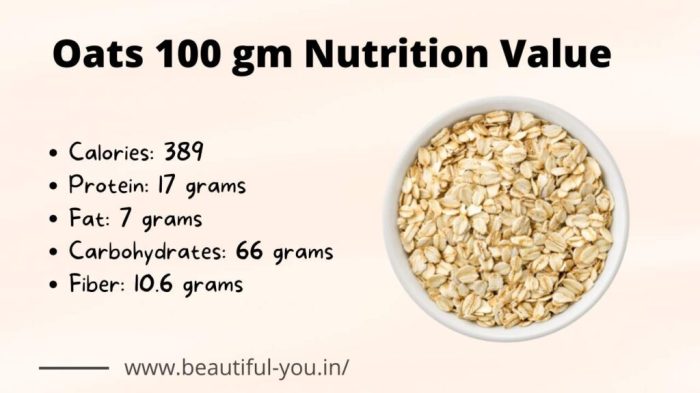
Oats are a popular grain choice due to their nutritional value, including their protein content. Compared to other commonly consumed grains, oats offer a moderate amount of protein, but with unique advantages and disadvantages.
The following table compares the protein content of oats to other grains per 100g:
| Grain | Protein (g) |
|---|---|
| Oats | 17 |
| Wheat | 12 |
| Rice | 8 |
| Quinoa | 14 |
Advantages of Oats as a Protein Source:
- Higher protein content than wheat and rice:Oats provide more protein per serving than wheat and rice, making them a better choice for individuals seeking to increase their protein intake.
- Complete protein:Oats contain all nine essential amino acids, making them a complete protein source for vegetarians and vegans.
- High fiber content:Oats are also rich in fiber, which helps promote satiety and supports digestive health.
Disadvantages of Oats as a Protein Source:
- Lower protein content than quinoa:Quinoa offers a slightly higher protein content than oats, making it a better choice for individuals with high protein requirements.
- Can be more expensive than other grains:Oats can be more expensive than wheat and rice, which may limit their accessibility for some individuals.
Recommendations for Incorporating Oats into a Balanced Diet:
Oats can be incorporated into a balanced diet in various ways:
- Oatmeal:Oatmeal is a classic way to enjoy oats, providing a warm and filling breakfast option.
- Oatmeal cookies:Oatmeal cookies are a sweet and satisfying snack or dessert that incorporates oats.
- Oat bran:Oat bran is a concentrated source of fiber and protein that can be added to smoothies, yogurt, or baked goods.
- Oat milk:Oat milk is a dairy-free alternative to cow’s milk that provides a good source of protein.
By incorporating oats into a balanced diet, individuals can benefit from their nutritional value, including their protein content.
Protein Supplementation
Protein supplementation plays a vital role in enhancing protein intake, particularly for individuals with increased protein needs or those following specific dietary regimens. Protein supplements provide a convenient and efficient way to meet these requirements.
There are various types of protein supplements available, each with its unique characteristics and suitability for different individuals. These include whey protein, casein protein, soy protein, pea protein, and brown rice protein.
Choosing and Using Protein Supplements Effectively
- Assess Protein Needs:Determine your daily protein requirement based on factors such as age, activity level, and dietary goals.
- Select a Suitable Supplement:Choose a protein supplement that aligns with your dietary preferences, allergies, and specific protein needs.
- Consider Quality:Opt for protein supplements from reputable brands that undergo rigorous testing and adhere to quality standards.
- Timing:Protein supplements can be consumed at various times throughout the day, depending on your training or dietary regimen.
- Avoid Overconsumption:Excessive protein intake can be harmful. Stick to the recommended daily protein intake and consult a healthcare professional if you have any concerns.
Plant-Based Protein Sources
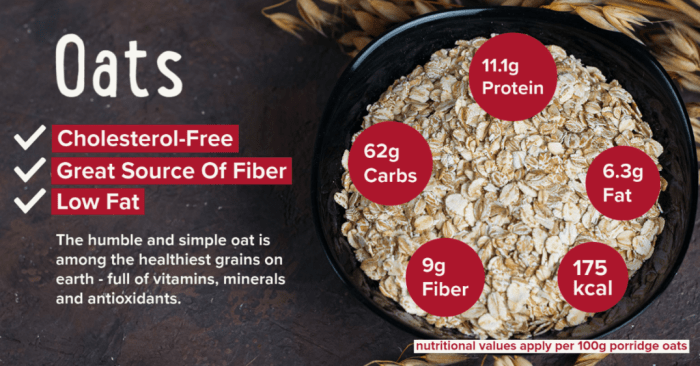
Plant-based protein sources are essential for vegetarians and vegans, as they provide the necessary amino acids for maintaining optimal health. These sources are derived from plants, such as legumes, grains, nuts, and seeds.
Some examples of plant-based foods rich in protein include:
Legumes
- Lentils (18g protein per cup)
- Chickpeas (15g protein per cup)
- Black beans (15g protein per cup)
Grains
- Quinoa (8g protein per cup)
- Oats (11g protein per cup)
- Brown rice (5g protein per cup)
Nuts
- Almonds (21g protein per cup)
- Walnuts (18g protein per cup)
- Pistachios (20g protein per cup)
Seeds
- Chia seeds (16g protein per cup)
- Flax seeds (18g protein per cup)
- Hemp seeds (33g protein per cup)
While plant-based proteins provide essential amino acids, they may not be as easily absorbed as animal-based proteins. However, combining different plant-based protein sources in a single meal can improve absorption.
Additionally, plant-based protein sources are often rich in fiber, vitamins, minerals, and antioxidants, which can contribute to overall health and well-being.
Closure
In conclusion, our journey into the realm of protein in 100g oats has illuminated the multifaceted nature of this essential nutrient. From its role in muscle building to its significance for plant-based diets, oats have emerged as a versatile and valuable protein source.
Understanding the nuances of protein absorption and supplementation empowers us to make informed choices about incorporating oats into our dietary regimens.



